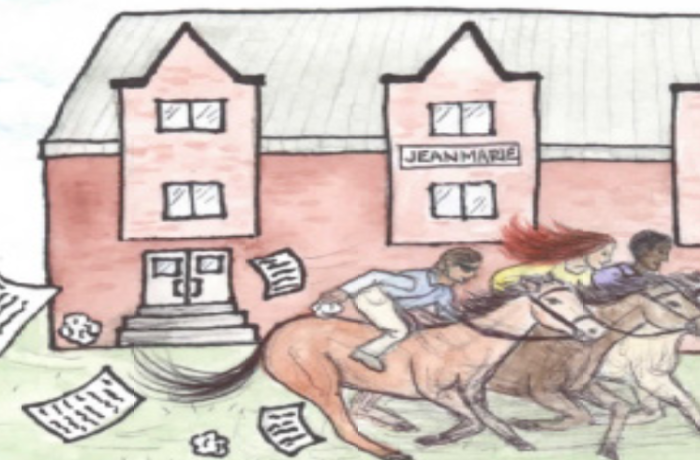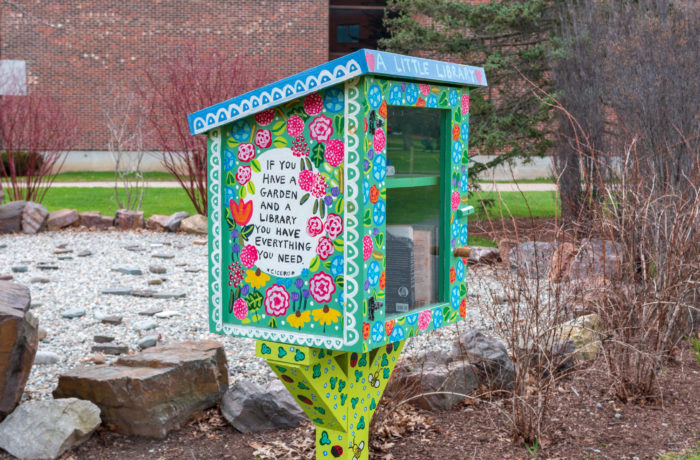
By Madeline Clark
Senior Editor
Thomas Davis, 55, sweeps his mop in long, rhythmic strokes across the tiled first floor of St. Michael’s College’s Jeanmarie Hall. His movements are slow and methodical. As Davis works on the floors, professors and students pass, heading from class to class. Some of these passers-by apologize to Davis or move towards the walls. He tells them, “It’s ok,” only ever so briefly pausing his long, slow, mop-strokes.
Davis has been a custodian at the college for 33 years. His work includes cleaning 21 offices on the second floor of Jeanmarie twice per week, cleaning two bathrooms in St. Edmund’s Hall each morning, and cleaning 14 classrooms in Jeanmarie.
“If you want to do it right, it takes 14 minutes [per classroom],” Davis said. Since the night shift was cut, and because he starts the day at 5 a.m., he only has about seven minutes to clean each room before classes begin at 8 a.m. This has made the shift to daytime work a challenge. “You gotta get the stuff off the rugs, dump the trash, and clean the marker boards. It takes time.”
In August, St. Michael’s College eliminated its custodial night shift and transitioned to two day time shifts to improve efficiency and concentrate the full workforce to daytime hours, said James Farrington, the director of facilities and architect at the college. Seventeen custodians were affected by the schedule change.
The Defender shadowed three custodians to learn more about their stories. During this time, they shared the changes and challenges that came from the schedule shift, as well as from the work itself.
“We had 18 people working nights, we were short staffed,” Farrington said, explaining that Mondays and Fridays get the greatest number of call-ins for sick days. “The only advantage to cleaning at night is that the buildings are empty; but it’s harder to see what you’re cleaning.”
According to Farrington, the transition had its challenges. “It was painful getting through the process,” he said. “[However,] the quality of our work has gone up.”
Night and Day:
John Waldron, 62, the supervisor of the early shift custodial team, said that the switch from nighttime to daytime work has come with both positives and negatives. “We certainly have a harder time getting the school ready for daytime activities,” he said. “On the other hand we get to interact with individuals who are here during the day which we never did before.”
For students, faculty, and staff at the college, it also puts faces to one of the more critical roles of keeping the institution running smoothly.
Tight schedules:
Back in the halls of Jeanmarie, Davis said he works 40 hours per week at an hourly rate, with some healthcare and retirement benefits in addition to 30 days paid time off. He cleans Monday through Friday from 5 a.m. to 1:30 p.m. before heading back to his mobile home located near Cumberland Farms at the edge of the college’s campus. Davis struggles with his vision so he has to walk to work or get a ride from one of his coworkers.“I’m registered blind by the state of Vermont, but it’s basically borderline,” he said. “It’s just enough that I can’t drive.” He walks to campus in snowstorms when he cannot get a ride. “In the last 10 years I’ve called out [sick] about four days,” he said.
At his mobile home, Davis goes to bed around 4 p.m. or 5 p.m. to wake up at 12 a.m. He said it is a six-hour schedule adjustment he made to enable a balance between work and his hobbies. “I want to watch my prime time shows so I do it at 12 a.m. when everything repeats.” Davis said his home houses a collection of music and films, ranging from VHS to Blu-Ray and spanning some 4,000 titles. “It’s a hobby,” he said. “Way back when, my hobby was drugs but I switched to music, then film.”
Davis quit using heroin cold turkey in the 1980s. “For seven days it was hell, but that opened up the door [to a better life],” he said. After quitting drugs, Davis said he was able to put the money he earned at work towards purchasing music and films. He acknowledged he still thinks of drugs from time to time but keeps himself off of them by considering how they are a “waste of money.”
Davis lives alone and said that on the night shift he was able to be alone with his own thoughts. However, he added, he is the kind of person that gets along with everybody. Now on the day shift, he interacts with many more people.“Most of the kids here I get along great with and I get along great with the faculty and staff too,” Davis said. “If they don’t want to talk I don’t talk to them, and if they want to talk I talk to them.”
Dennis Wolcott, 57, starts his day at 2 a.m., a time when some students are just going to bed. He drives 36 miles to the college where he has worked as a custodian for seven years.
Wolcott said he came to the college at a time when he was between jobs. Previously, he had worked as the night shift custodian in a warehouse where baby food was made. Today, Wolcott starts cleaning the academic and residential halls of the college at 5 a.m. He said that as a former worker of the night shift, it was a definite adjustment.
“Now that our schedule got flopped all around it makes some things harder to do,” Wolcott said. “It’s a challenge, but I don’t look at it that way. I know what’s got to be done and I do it.”
Wolcott said that working the day shift at the college means he has to work around students. “Most of them aren’t too bad, some of them go on by and say nothing. The bigger share of them are polite -they say ‘excuse me’ and stuff.” He said that many students are busy with homework so he gets as much as he can clean without disturbing their studies.
On a recent morning, Wolcott was busy cleaning the first floor of Dion so that he could get up to the Roy Room to prepare the space for an 8 a.m. event. Normal duties for Dion include dust mopping, using a machine to wash the floors, and wet mopping any areas the machine cannot reach. Wolcott zipped around the large space grabbing trash bags that overflowed with Einstein’s food and dripped orange liquid. He swept up piles of dirt into long, thin, lines that looked like a bird’s-eye view of mountain ridges -one of which produced a writhing stink bug. His no-nonsense manner and focus made it all seem routine.
Reactions to the change:
Farrington said that he has heard only positive reactions to the change in shifts and that it allows the custodians to build a more cohesive team. “The night staff was very isolated. They didn’t get to come to speakers on campus during the day or the barbeque we host for our staff,” Farrington said. He added that with the change, custodians might now enjoy these events. The custodians have access to the college’s portal and events calendar via computers in their breakroom and in Dupont Hall.
Waldron said that when he and his crew worked the night shift they only heard negative feedback such as things that were not done or that someone wanted improved. “When we’re here during the day we hear a lot of ‘thank you’ and ‘you guys are doing a great job,’” Waldron said. “I think from a morale point of view I’ve seen a significant improvement. Is it as effective in terms of cleaning? I don’t know.”
He said, “I think in time it will be more good than bad. It’s not real clear at the moment but I think we’re going to get there.”
Although he ends his day at 1:30 p.m., Wolcott does not have much time to attend events. “After working an eight-hour day…it’s kind of hard to attend too much of anything and still do the stuff I have to [do] at home.”
Wolcott lives with his 81-year-old mother. “She has a bad knee that bothers her so I do anything I can to help her out,” Wolcott said. He aids his mother with laundry, taking out garbage and recycling, as well as driving her to the bank and grocery store. “I don’t have much of a social life at all,” he said.
Behind the scenes:
Each morning, Shery Taft, 54, enters the college’s library through its backdoor 20 minutes after 5 a.m. She has worked as a custodian at the college for nearly 13 years. She starts her day wiping down the circulation desk and taking out the trash and recycling on the entrance level of the library.
“Then [I] go and clean four bathrooms, take the trash out, vacuum, thoroughly,” Taft said. “It’s very physical work,” she said. “You’re on your toes moving around, which is good.” Taft cleans the library with one other custodian or sometimes alone if he is needed elsewhere.
Taft said her job has changed with the cut of the night shift. “We can’t do a really thorough job like we want to…because classes are going, or people are coming in and you can’t really be in their way.” Like Davis and Walcott, Taft said she has had more interactions with students now that she works during the day. “Generally they’re pretty good kids. Sometimes you get a little ‘oh what’d you do that for’ but you say ‘okay’ and you keep on going.”
Taft works alongside her husband David Taft, 57. She said they have been married for 37 years and have always worked together. Mr. Taft has chronic obstructive pulmonary disease (COPD), which makes his job difficult. “He’s doing his best,” Taft said. “He’s doing alright.” The couple has no children, but does have a “roly poly” dog named Frankie.
“You actually get to see the daylight,” Taft said about now working the day shift, and explained that she can now go grocery shopping and make afternoon appointments.
She said she likes the flexibility of her job. “They [her supervisors] don’t care how you do your work as long as it gets done.” While she does not attend events at the college, she now has time to go to BINGO, and to have summer bonfires in her yard. “On the weekends we come alive,” Taft said.
What’s that in the trash cans?
While the shift to days has offered a new challenge, some of the difficult elements of custodial work have nothing to do with the time of day. Wolcott detailed a time he had to clean vomit off the stones outside the entrance to the Dion Student Center. “The college can’t just leave that stuff. Somebody does have to clean it up, and that just happened to be me.” He said he is “not thrilled” about this kind of task, but that accidents happen.
Other messes, he said, are not accidents. Davis said he often picks up beer bottles from the classrooms after the weekend and that “quite regularly” he finds the trash cans in multiple classrooms filled with urine.“This is something that has been ongoing,” he said.
Waldron said he does not know if the urine in trash cans comes from students or community members, but that the staff has been working on the issue for a long time and that it has recently become worse. The problem used to be isolated to one or two classrooms, but now, Waldron’s staff finds urine in a half dozen classrooms on a near-daily basis. “I sincerely hope it isn’t one of our students, because it doesn’t seem like the values we all hope we’re living by here,” Waldron said. Both Waldron and the department of Public Safety have been discussing possible ways to identify those responsible and solve the problem.
What’s in the dorms?
Taft said she once volunteered to take a weekend shift in the college’s dorms. She said her coworker warned her to tie the garbage bags before removing them from the hallway cans. “You never know what the hell is in there,” Taft said. That day, she removed three garbage bags full of vomit, cleaned a shower splattered with vomit, a sink filled with vomit, and a toilet overflowing with vomit.
“I got home and took an hour-long shower. I felt ugh,” Taft said.
Is the job worthwhile?
Wolcott said that despite its challenges, he enjoys his job. “It gets a little tougher as years go by,” he said. “I enjoy being around students…it’s the thing that keeps me coming.”
Davis, has seen a lot of students in his 33 years. As he moves through Jeanmarie Hall pushing his mop across the tiles, he smiles and nods as people pass him.
He pauses to say, “I do it for the college.”


